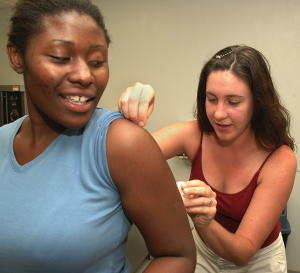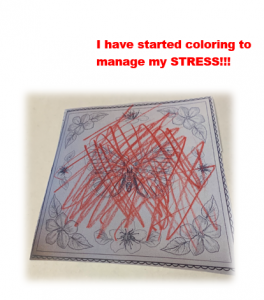
by Laurie Osgood | Mar 3, 2020
Friendships are an important part of life, and friendships can have a tremendous impact on our personal well-being and overall mental and physical health. Social isolation can lead to depression and loneliness. The relationships that we build with our family and friends can affect the quality of the friendships that we develop over our lifetimes. Some people thrive socially and develop deep, meaningful connections with others, while others only maintain distant friendships. However, it is important for us to help our children learn to develop these important social skills. Researchers have long documented links between the quality of relationships between family members and their relationships with their peers. Participation in team sports can have lasting benefits, including responsible social behaviors, good sportsmanship, strong leadership skills, academic success, and self-confidence.

Parents can form lasting friendships while supporting their kids in youth sports. (Photo source: Laurie Osgood, UF/IFAS Extension)
When It Comes to Youth Sports, Parents Don’t Always Behave Themselves.
As team sports become more competitive, there is increased attention placed on the negative aspects of team sports, mainly parental expectations and behavior. Having spent a large part of my life sitting in the stands watching my children play team sports, I have developed deep, long-lasting friendships with the parents of my children’s friends. These friendships are often maintained between parents long after our children put away their soccer cleats. Of course, overbearing parents can take the fun out of sports for our children. Many children drop out of team sports because they are no longer having fun and participation becomes too stressful.
What Can Parents Do to Help Their Kids Develop Positive, Warm Friendships?
- Continue to nurture and support the friendships that you have established throughout your lifetime.
- Be a good sports parent by showing support to your child.
- Model good friendship skills. This will help youth understand social competence.
- Be happy and have fun at your child’s competitions.
- Minimize pressure & don’t coach your child from the sidelines.
- Nurture the youth’s ambitions, but don’t let them get too wrapped up in the competitiveness.
- Be respectful of your child’s teammates, coach, opponents, and the game’s rules and traditions.
It is our job as parents to teach our children social skills to help them grow as individuals, not just athletes. As parents it is our job to nurture their emotional and physical development. Even as adults we must continue to stay connected with our friends and families. As we grow older, good friendships can prevent loneliness, improve our health, boost our well-being, and even add years to our lives.

by Melanie Taylor | Jan 9, 2020

One of the best ways to help prevent the flu this season is to get vaccinated. Even if you still get the flu, the severity and length of illness may be diminished. (Photo source: UF/IFAS file photo)
The holiday season has passed and now we are well on our way into 2020 with a very severe flu season. You are the best person at making sure you do not get the flu. Here are a few tips that you should consider as this flu season continues and still has not reached its peak.
- GET VACCINATED. It takes, on average, two weeks for the flu vaccine to reach its full potential, so if you have not gotten the flu shot, get it NOW. Even if you still get the flu, it will likely be shortened in time and strength if you are vaccinated.
- WASH YOUR HANDS. Washing your hands frequently will help protect you from the flu. If soap and water are not available, use an alcohol-based hand sanitizer.
- AVOID CLOSE CONTACT WITH PEOPLE WHO ARE SICK. Be sure to avoid direct contact with anyone that is sick. If you must come in contact with them be sure to wash your hands once you leave. If you are sick, keep your distance from others to protect them from getting sick too.
- AVOID TOUCHING YOUR FACE. Germs are spread quickly when a person touches something that is contaminated with germs and then touches his or her eyes, nose, or mouth. So make a conscious effort to keep your hands away from your face.
- COVER YOUR MOUTH AND NOSE WHEN YOU COUGH AND SNEEZE. Cover your mouth and nose with a tissue when coughing or sneezing, or sneeze/cough into your closed elbow. These steps may prevent those around you from getting sick.
- STAY HOME WHEN YOU ARE SICK. If possible, stay home from work and school when you are sick. This is the best way to avoid spreading your germs to other people. The CDC (Centers for Disease Control and Prevention) recommends you stay home for at least 24 hours after your fever is gone except to get medical care or for other necessities. They also recommend that your fever should be gone for 24 hours (without the use of a fever-reducing medicine) for you to no longer be considered contagious.
- PRACTICE GENERAL GOOD HEALTH HABITS. Clean and disinfect frequently touched surfaces at home, work, and school, especially when someone is sick. Wash backpacks, coats, and other items regularly. Get plenty of sleep, be physically active, manage your stress, drink plenty of fluids, and eat nutritious food.
Follow the tips above and maintain the best health practices possible and hopefully you will be one of the lucky people that avoids the dreaded flu this year. Wishing you all a healthy and happy 2020!
Source: https://www.cdc.gov/flu/prevent/prevention.htm

by Stephanie Herzog | Nov 27, 2019
The holidays are upon us! The holidays are a beloved time of year for many, but they are also a source of stress. Stress is defined by an individual’s values, beliefs, and perceptions, so it may look different to everyone. Whether you’re preparing for parties or family to come visit, dreading interacting with a certain family member, planning your holiday budget, or struggling with remembering a lost loved one, stress affects many people this time of year. Here are three tips for managing your stress this season.

Loving and caring relationships go a long way to relieve stress. (Photo Source: UF/IFAS)
1. Be Meta
Metacognition is thinking about your own thought processes. If you feel your stress winding up, stop and analyze your thought processes and the environment around you.
Ask yourself a question such as:
“Why I am feeling this way?” or “Why did I have this connecting thought and/or emotional reaction because of this specific event?”
Consciously recognize your signs of stress and do something about it:
“I’m feeling stressed because my muscles are tight and I’m irritable, so what is a healthy coping mechanism I like to use, and when can I take a break to go cope?”
Being more aware of your thoughts, feelings, and environment helps keep you in tune with managing your stress in a healthier way.
2. Take A Moment
Remember that to successfully help others, you first need to take care of yourself. The holidays make that even easier to forget, it seems. Too much psychological stress can lead to physical illness, which takes an even bigger toll on your overall well-being. So take a moment to yourself to refresh or recharge, whether it’s five minutes alone meditating or practicing mindfulness/awareness, going for a short walk, or taking an amazing 20-minute power nap. Reach out to friends and family to help you cover your responsibilities (such as caring for children), if needed, while you take a moment. Right now, I’d like you to take a moment and make a list of 3-5 simple things you can do to help yourself de-stress as the holidays approach, so you are armed with coping power when the stress arrives.
3. Don’t Deny
Denial is a poor stress management too; it’s a defense mechanism, not a healthy coping skill. It can be beneficial in the short-term, depending on the situation, but is largely harmful if used long-term. The refusal to believe there’s a problem only brings more stress. Not only does denial hurt you, but it hurts the people around you as well. Remember to trust those you love if they express concern about you or feel as though you’re denying something that’s negatively affecting you. Try not to defend yourself or attack them. First, take a step back, breathe in, and examine any validity to their claim with a good dose of humility. Chances are, they mean well and want to help, so it’s worth a self-examination. The ultimate goal is for you and your loved ones to be healthy and happy, and coping with stress positively is one great avenue to achieving that goal!
Enjoy yourself this time of year as you serve and spend time with others, but remember also to take care of yourself!
Source:
Boss, P. (2002). Family stress management: A contextual approach (2nd ed.). Thousand Oaks, California: Sage Publications.

by Angela Hinkle | Nov 21, 2019
Make the pledge Tuesday, December 3rd to Dine In for better health – physical, social, and cultural.
Why
Most of us eat every day without thinking about it. We need to eat to nourish our body, so it’s just a regular thing we do. But eating also can be an important social and cultural way for families to come together.

FCS Dine In Day
When we eat together as a family, it gives us the opportunity to practice cultural traditions and share food histories. We get the chance to explore new foods and learn new skills – like eating with chopsticks. We may get the chance to learn and practice table manners and learn literary and conversation skills. Paul Fieldhouse of the Vanier Institute of the Family says, “For young children, ‘table talk’ may be the main source of exposure to family conversation and the expression of thoughts, ideas, and emotions.” Eating the family meal also can help us de-stress by setting a reassuring rhythm and structure to our day.
Eating family meals at home has additional benefits. The University of Washington found that families who cook and eat more often at home tend to eat a healthier diet. Their Healthy Eating Index is high – meaning they eat more fruits and vegetables and less calories, sugar, and fat. They eat smaller portions helping to regulate weight. Some research suggests we eat smaller portions at home because we eat more slowly and talk more. This, however, does not equate to a higher cost. Meals cooked at home generally cost less than those eaten out.
How
So, how can your family eat more meals together at home?
- Try making and eating meals at home a priority for your family. Think about how important it is spending time together.
- Keep it simple. Don’t worry about making a big, fancy meal.
- Start with just a few meals a week. Then slowly add more meals together as you find your “family meal groove.”
- Let the whole family help plan meals. Think about foods your family likes and build around those ideas. Try to get all the MyPlate healthy food groups in – whole grains, plenty of fruits and vegetables of all colors, shapes, and textures, lean plant and animal proteins, and low- and no-fat dairy. Make your grocery list together.
- Let everyone be involved in planning, preparing, table setting, and cleaning up afterwards.
- Make it a goal to start this December 3rd to Dine In for better health.
Resources:
(Still) Eating Together: The Culture of the Family Meal. Retrieved November 16, 2019 from https://vanierinstitute.ca/eating-culture-family-meal/
Cooking at Home Tonight? It’s Likely Cheaper and Healthier. Retrieved November 15, 2019 from https://www.sciencedaily.com/releases/2017/03/170314150926.htm

by Judy Corbus | Jul 5, 2019

Visit places close to home for a vacation that won’t break the budget. (Photo source: UF/IFAS)
“Summer” and “vacation” seem to go hand-in-hand, as school is out and schedules are a little more laid back. Now that summer is here, you may be making plans for a getaway to your favorite spot. Perhaps, you are saving up for that dream trip next summer but you’d still like to take a break and have some fun this year. How can your family and you enjoy yourselves without breaking the bank? The answer might be right in your own backyard!
- Plan a staycation. Rather than traveling out of the area, use your home as base and plan some fun activities – family game time, camping out in the backyard and making s’mores, or running through the sprinklers and having a water balloon fight. Or just relax with a good book and a glass of lemonade or catch a few zzzs under a tree. The key is to turn off the devices, forget about work, and not worry about projects around the house – they will be there after you “return.”
- Plan day trips. These can be a part of your staycation, too. If you live fairly close to the beach, pack the car and head out early to enjoy the surf before temperatures rise. Make a day of it by enjoying the sunset before heading home. State parks also offer hiking and biking trails, boating and canoeing, swimming, playgrounds, picnic areas, and other fun activities. Florida boasts of 175 state parks, trails, and historic sites around the state so your next adventure may be just a short drive away. Check out https://www.floridastateparks.org/ for a park near you.
- Check out local events. Libraries and museums often feature special exhibits for free or a nominal charge. Several years ago, I visited a traveling exhibit about the Titanic at an arts center an easy drive from home. It made for an enjoyable and educational afternoon! Contact your local library or museum for a schedule of summer program offerings.
- Take part in a service project. A number of families are opting to use some of their vacation time to help others in need in their communities – projects include yard work, painting, basic home repairs, assisting with a food pantry/clothes closet, and serving meals to the homeless. These projects may be sponsored by a community service organization or church. During this past spring, local media outlets reported on several groups of college students representing campus ministries, fraternities, and other organizations who volunteered their Spring Break time to assist with Hurricane Michael clean-up and recovery. Participating in a service project as a family can be a meaningful way to give back to the community and make a difference locally. Contact your place of worship or local service organizations for opportunities in your area.
This summer, “recharge” without a super charge to your wallet!
Source: https://www.daveramsey.com/blog/i-need-a-staycation

by Laurie Osgood | Jun 7, 2019
 What is Stress Anyway?
What is Stress Anyway?
The traffic is awful, a report is due, the laundry is piling up, and the kids are fighting. Life is full of stress! According to the National Institute of Mental Health, stress is how the brain and body respond to any physical, mental, and/or emotional demand. Not all stress is bad. For example, stress can help motivate us to get things done. When faced with a threat or stressful event, our bodies produce hormones such as epinephrine, which can cause a temporary rise in our heart rate and blood pressure. Chronic, un-managed stress can cause long-term symptoms including headaches, high blood pressure and even problems sleeping.
Identify the Sources of Stress in Your Life
Feeling stressed is normal, but some people cope with stress better than others. Our thoughts, lifestyle and emotions can affect how much stress we endure. We must identify the causes of our stress before we can begin to manage them. Although the causes of stress are similar for both men and women, it is how we recognize and manage our stress that makes us different.
Common Causes of Stress:
• Work or unemployment
• Money, finances
• Drug or alcohol abuse
• Family breakdown
• Health issues
• Major life changes
What are the Symptoms of Stress?
Our bodies automatically respond to stressors in our lives. However, constant and uncontrolled stress can lead to serious physical and mental consequences. No matter how stressful your life seems, we must recognize the warning signs of stress and take action.
Watch out for the following warning signs:
• Feeling tired, not sleeping properly
• Loss of concentration and an inability to complete projects
• Irritability, low self-esteem or mood swings
• Feeling tense or anxious
• Feeling unmotivated
• Withdrawing from family and friends
• Excessive drinking and/or drug use
• Physical signs such as headaches, chest pains, high blood pressure, digestive problems or aches and pains
Men and Woman Handle Stress Differently
How stress affects you may depend upon your gender. Men and women recognize and react to stress in different ways, both mentally and physically.
When feeling stressed, women reach out to friends and family. They seek support to lower their stress and find a solution to their challenges. By talking about their emotions, women are able to process their feelings and share the pressure of their situation.
When men experience stressful situations, they are likely to hide their feelings or change the subject to escape a stressful situation. Men find it hard to talk about their feelings or ask for help when faced with pressures from their job, family issues or money worries. Men prefer to play sports or listen to music to manage stress.
Stress Reduction Strategies for Men and Women
Stress is a normal part of life, but chronic stress can be bad for our health. Stress management means taking control of your thoughts, emotions, and lifestyle. Making simple changes in your life such as maintaining a network of close friends, exercising, eating a healthy diet, and getting enough sleep can help reduce your overall stress.
Resources:
The American Psychological Association: https://www.apa.org/news/press/releases/stress/2010/gender-stress
The National Institute of Mental Health: https://www.nimh.nih.gov/health/publications/stress/index.shtml
The Electronic Data Information Source of UF/IFAS Extension. EDIS: https://edis.ifas.ufl.edu/pdffiles/FY/FY51700.pdf
To learn more about how to cope with stress, contact Laurie Osgood, Family and Consumer Sciences Agent at the UF/IFAS Extension Office in Gadsden County (850) 875-7255 or Osgoodlb@ufl.edu














